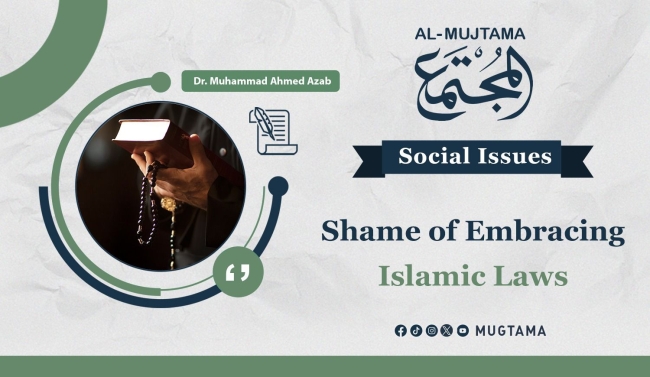The divine legislations revealed by Allah to His messengers represent eternal justice and continuous goodness. They are flawless, unaffected by the passage of time, and are as essential to people as air, food, and water are to their bodies. Just as the body can only thrive on what Allah created for its well-being, human life and dealings can only be rightly guided by laws prescribed by the One who knows what sustains both the body and the soul.
Throughout history, never have people replaced food with stones or tree trunks, nor have they considered water unsuitable for quenching their thirst and substituted it with iron or metal. Allah created human beings and shaped them as He willed, providing them with what ensures their welfare in both worlds. He granted all people—righteous or sinful—certain shared provisions and decreed laws that a few nations adhered to while many others rejected. Consequently, destruction befell many of those who turned away, sometimes through sinking into the earth, and at other times through complete annihilation.
These divine laws are a safeguard for humanity and the foundation of the world. Through them, Allah upholds the heavens and the earth. When Allah intends for the world’s end, He lifts the remaining traces of the Shariah. The Shariah given to the Prophet (peace be upon him) is the pillar of the world and the axis of success and happiness in this life and the Hereafter. Unfortunately, some of its carriers failed in their responsibility, depriving themselves of its blessings.
Feeling Ashamed of Divine Legislations
Some Muslims have become embarrassed by certain rulings of Shariah, especially when they clash with dominant Western or global values, particularly regarding human rights or women’s rights.
For example, some women—and even men—may feel ashamed of adhering to the hijab in societies that view it as traditional or outdated. This embarrassment extends to punishments prescribed for crimes, particularly those affecting the five essential necessities that Shariah came to protect: religion, intellect, life, wealth, and honor. For theft, Shariah prescribes cutting off the hand, and for adultery, it prescribes lashing or stoning under specific conditions. These punishments are often perceived as harsh and outdated by those influenced by Western thought.
Inheritance laws and acts of worship, such as prayer and fasting, can also become sources of discomfort for some Muslims in both Muslim and non-Muslim societies. The question is: Why do some Muslims feel ashamed of these teachings?
Causes of Embarrassment
Several factors contribute to this phenomenon:
1. Weak Understanding of Islamic Teachings
When a Muslim lacks proper understanding of the wisdom behind a ruling or punishment, it becomes difficult to justify adherence to it.
2. Influence of Western Culture
This is one of the most significant factors. Some Muslims mistakenly equate modernity and progress with adopting Western perspectives on ideas and legislations. Western culture, dominated by secularism, often exhibits open hostility toward religion, especially Islam. Many of its values contradict Islamic rulings, leading some Muslims to feel hesitant about defending or practicing their faith openly.
3. Negative Media Portrayal of Islam
The media often depicts Islamic rulings as inhumane or extreme, causing some Muslims to feel ashamed of their religious practices. Many media outlets prioritize viewership over accuracy, promoting false narratives that influence perceptions of Islam.
4. Social Pressure
In predominantly secular or Westernized societies, Islamic practices may be viewed as strange or extreme. Muslims in these environments may experience criticism or ridicule, leading them to feel embarrassed or hesitant about practicing their faith.
A girl may refrain from wearing the hijab in a Muslim-majority country because all her classmates at school or university are not wearing it. She or her guardian may fear the mockery of the surrounding society.
Manifestations of Embarrassment
Embarrassment about Islamic teachings can manifest in various ways:
- Constant Justification: Some Muslims try to justify Islamic rulings by claiming they are outdated or no longer applicable.
- Avoiding Discussions: Others avoid discussing certain rulings to escape debates.
- Abandoning Practices: Some stop practicing certain aspects of Islam altogether to avoid criticism, adopting Western values as their standard for acceptance and rejection.
Steps Toward a Solution
Every problem has a solution. Here are some suggestions for addressing this issue:
1. Promote Proper Understanding of Islam
Help Muslims understand the wisdom behind Islamic rulings and how they align with human nature.
2. Boost Self-Confidence
Teach Muslims to take pride in their faith and trust that there is no shame in obeying Allah's commands.
3. Community Awareness
Encourage open dialogue to counter stereotypes and correct misconceptions about Islam.
4. Instill Pride in Islam
Emphasize that Islam is a comprehensive way of life, not just a set of rules.
5. Utilize Media Effectively
Produce content that highlights the wisdom of Islamic teachings and addresses negative claims with a scientific and rational approach.
6. Learn from Authentic Sources
Muslims should seek knowledge from reliable sources that present Islam in its true form. Imam Al-Shatibi once said, “Whoever reflects on how the righteous predecessors conveyed the Sharia to both allies and opponents, in their reasoning to establish the obligatory rulings, will realize that they aimed for the easiest and most accessible ways to reach the seekers' minds—without affected organization or structured composition. They would speak freely without concern for the arrangement of their words, as long as the meaning was clear and easy to grasp. This approach, while aligned with the early scholars' method of knowledge acquisition, was intended to ensure the message reached its goal, not to imitate those who came before them.” (1)
In this regard, one can enroll in educational courses to learn the fundamentals of religion and understand the objectives of Sharia. It is rare to find a Muslim who has received a sound understanding of Islam from its well-grounded scholars and yet feels embarrassed by a true ruling that the Sharia has commanded or prohibited.
A Muslim must realize that Islam is an indivisible whole. It was not designed to conform to people's whims, shifting moods, or changing eras. It is not required for the laws of Islam to change according to environments, eras, customs, or cultures. No one can bestow favor upon Allah by being a Muslim; rather, it is always Allah's favor upon us. Islam instills in its followers pride in submitting to Allah. Allah the Exalted says: 'So do not weaken and do not grieve, and you will be superior if you are [true] believers.' (Al-Imran: 139).
This applies in both peace and war; we do not weaken or humiliate ourselves, regardless of the outcomes of our struggle—whether by arms or by ideas and adherence to the Sharia. The Sharia of Allah remains ever supreme and great, and its followers will share in its greatness to the extent of their adherence and pride in it.
-------------------------------------------------------------
(1) Al-Muwafaqat (1/28).


